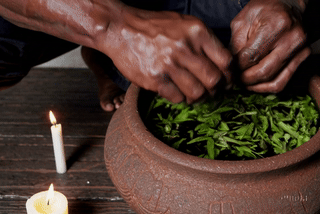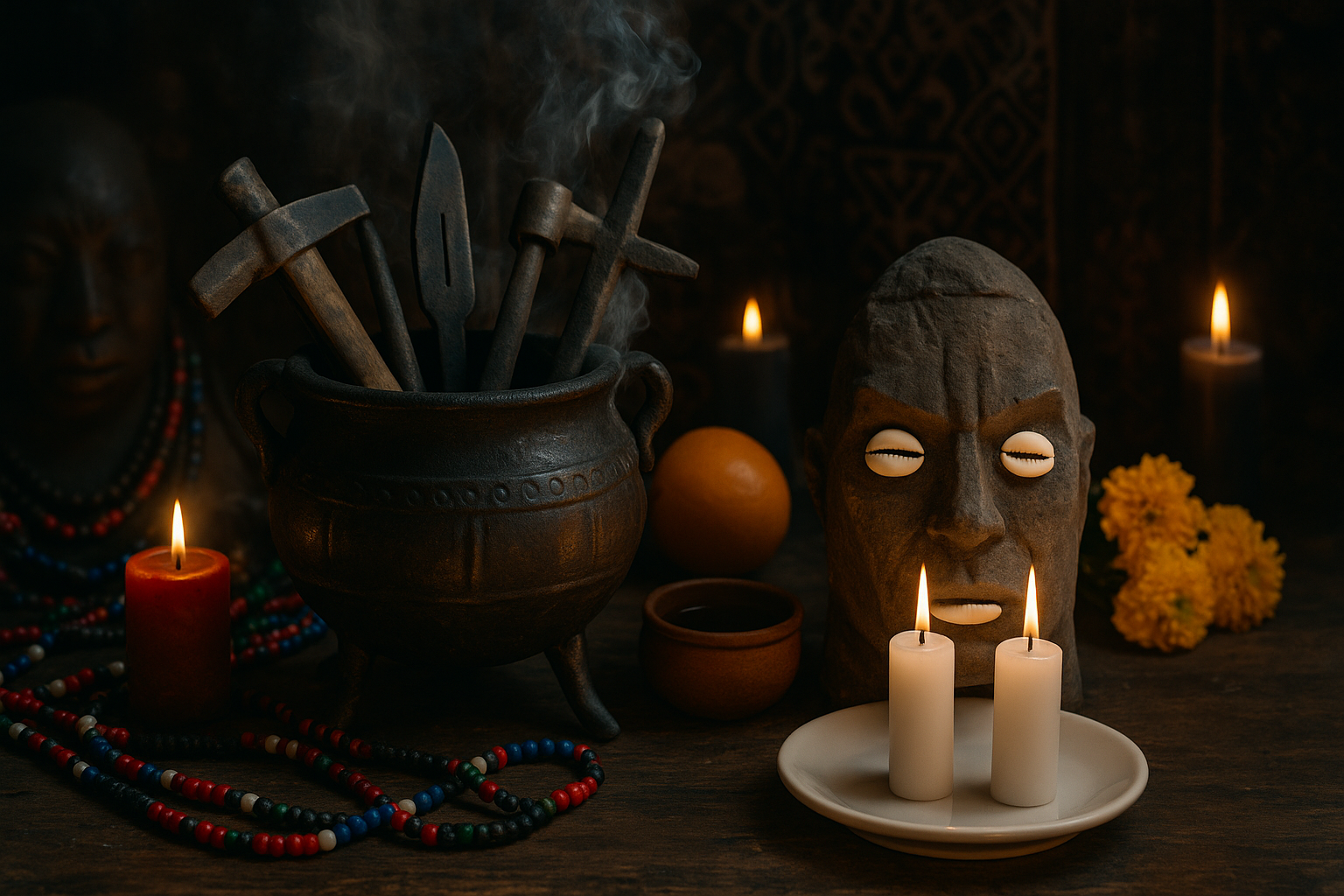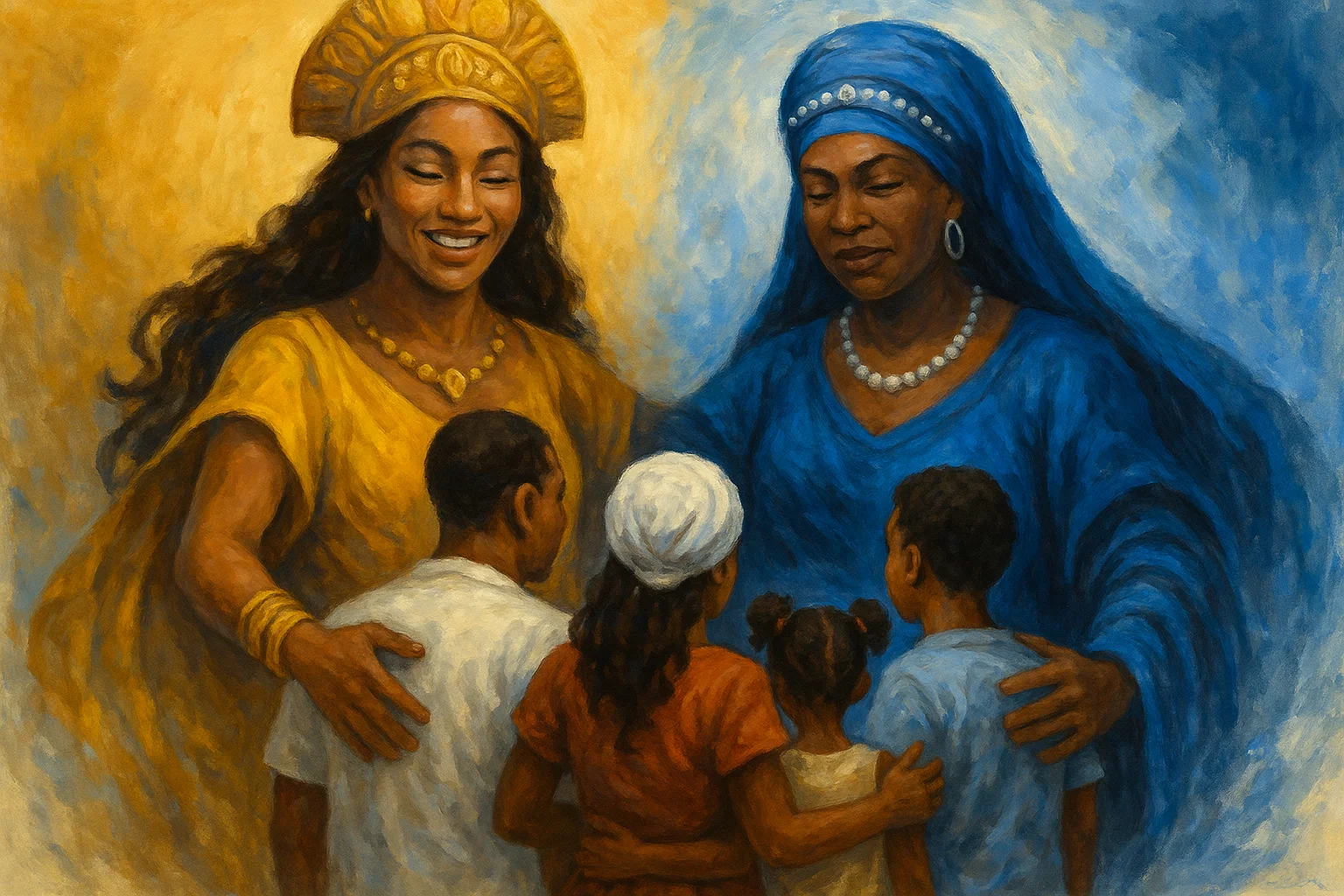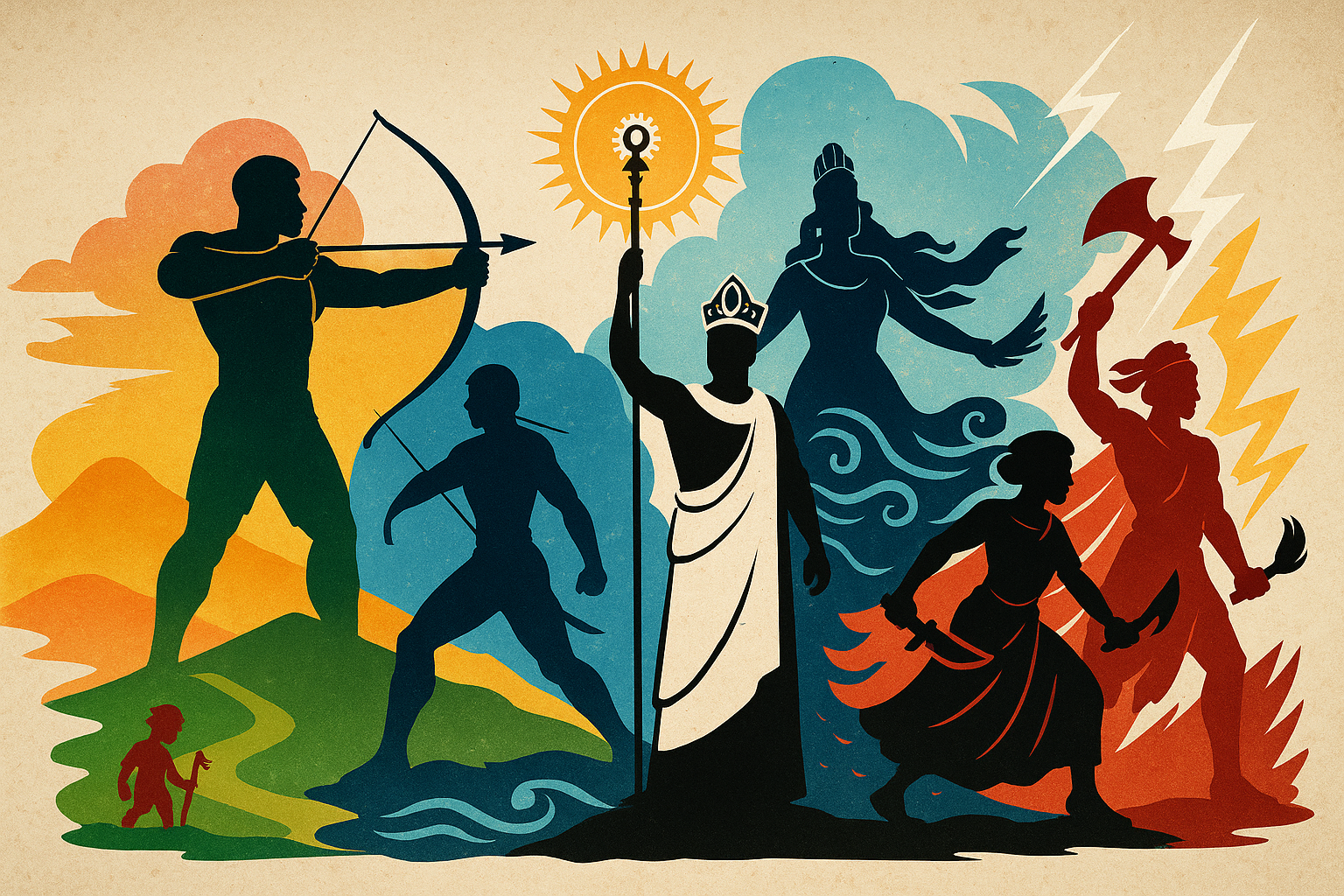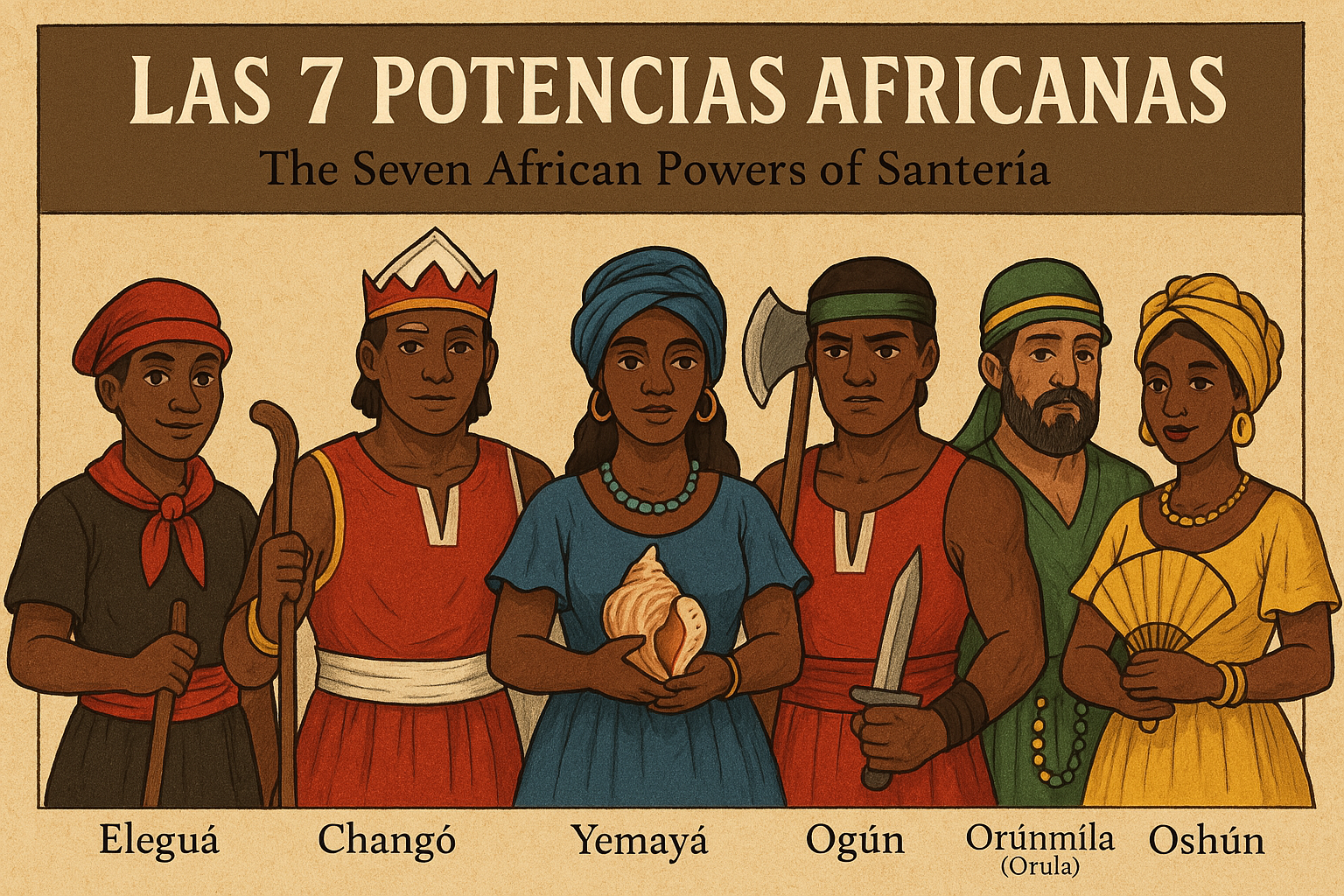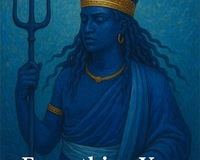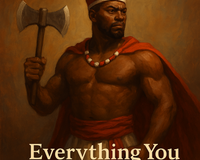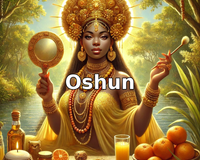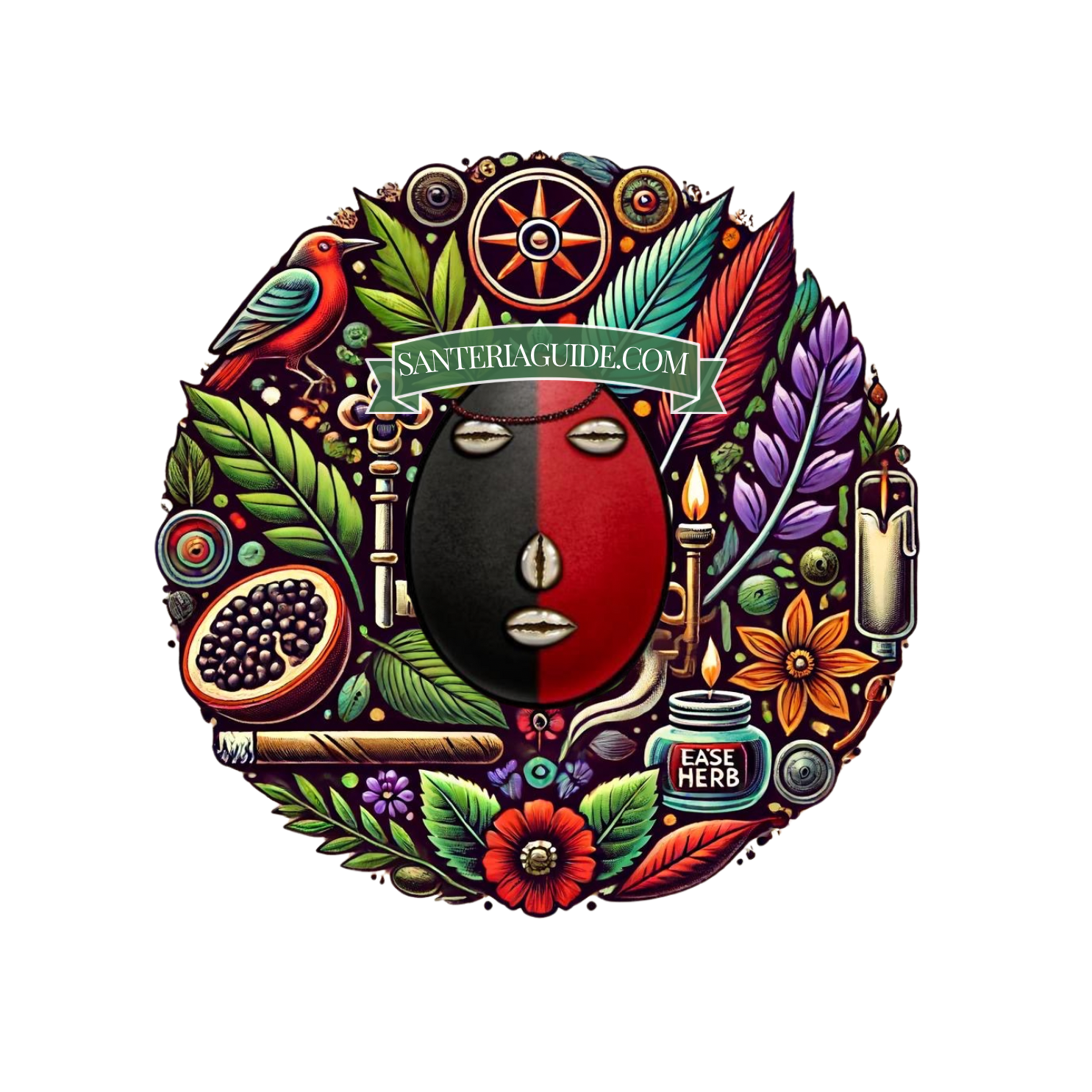Las 7 Potencias Africanas, or the Seven African Powers, refer to seven mighty Orishas (deities) revered in the Afro-Caribbean tradition of Santería. These seven Orishas are considered the most powerful and influential spirits in the Yoruba pantheon brought to the New World. Each embodies specific forces of nature and human endeavor, and collectively “Las Siete Potencias” are invoked for guidance, protection, and blessings (Las Siete Potencias - Wikipedia, la enciclopedia libre). In diaspora practices, devotees often call upon all seven together to address all aspects of life – love, prosperity, justice, health, opportunity, and more – ensuring that “all bases are covered” in receiving divine help (The Seven African Powers: The Most Powerful Orishas). This blog post delves into the rich spiritual background of each of these seven African Powers, their significance in Santería, their attributes and areas of influence, and how spiritual seekers can respectfully connect with them on their journey.
Who Are the 7 Potencias Africanas (Seven African Powers)?
In Santería (also known as Lucumí or Regla de Ocha), the term 7 Potencias Africanas refers to seven principal Orishas – powerful deities of the Yoruba religion – who are central to worship. While lists can vary slightly by tradition, the seven African Powers are commonly named as Eleguá, Obatalá, Orúnmila (Orula), Ogún, Oshún, Yemayá, and Changó (Las Siete Potencias - Wikipedia, la enciclopedia libre). These are the “seven black princes” of Yoruba spirituality (The 7 African Powers: Who they are, What they are for, History and more), each ruling different domains of nature and human life. It is believed that together, these seven Orishas “rule over all things humans need – including love, fertility, power, justice, healing, and opportunity” (The Seven African Powers: The Most Powerful Orishas). Devotees may petition them as a group known as the Seven African Powers to receive holistic blessings, or appeal to each one individually for help in their specific area of influence (7 African Powers (7 Potencias Africanas) 14 Day Jumbo Multicolor Candle – “I am supported by sacred forces as I overcome all obstacles in my path.” - Lazaro Brand Spiritual Store).
(The Seven African Powers: The Most Powerful Orishas) An artistic figurine set representing Las Siete Potencias Africanas – the Seven African Powers (Eleguá, Obatalá, Changó, Yemayá, Ogún, Orúnmila, and Oshún). These Orishas are central to Santería practice and are often invoked together for comprehensive blessings.
One distinctive aspect of Santería is religious syncretism – during colonial times, Yoruba deities were aligned with Catholic saints to preserve their worship under oppression. Each of the 7 Potencias Africanas became associated with a Catholic saint whose attributes resembled the Orisha’s nature (The 7 African Powers: Who they are, What they are for, History and more) (The 7 African Powers: Who they are, What they are for, History and more). For example, Eleguá (the trickster gatekeeper) is syncretized with Saint Anthony (San Antonio), Obatalá (wise elder and creator) with Our Lady of Mercy (Virgen de las Mercedes), and Changó (lord of thunder) with Saint Barbara (The 7 African Powers: Who they are, What they are for, History and more) (The 7 African Powers: Who they are, What they are for, History and more). This syncretism allowed enslaved Africans and their descendants to secretly honor the Orishas behind a Catholic façade. Below is a summary of each of the seven African Powers, their key attributes/domains, and their corresponding Catholic saint figures:
| Orisha (7 Potencias Africanas) | Key Attributes & Domains | Syncretized Catholic Saint |
|---|---|---|
| Eleguá (Eleggua) | Guardian of crossroads; opener of paths and opportunities; messenger between worlds; trickster who rules fate and chance (The Seven African Powers: The Most Powerful Orishas) (The Seven African Powers: The Most Powerful Orishas). Colors: red and black. Offerings: candies, toys, cigars. | St. Anthony of Padua (San Antonio) (7 potencias africanas: colores, significado y mucho más) – also Holy Child of Atocha in some traditions. |
| Obatalá | Orisha of creation, peace, purity, and wisdom; father/mother of humanity (Obatalá has androgynous paths). Governs the mind, justice, ethics, and all things white. Colors: white. Offerings: white flowers, coconut, milk, eggshell powder (efun) (The Seven African Powers: The Most Powerful Orishas). | Our Lady of Mercy (Virgen de las Mercedes) (The 7 African Powers: Who they are, What they are for, History and more) – sometimes also Jesus Christ for his creator role (The Seven African Powers: The Most Powerful Orishas). |
| Orúnmila (Orula) | Orisha of wisdom, divination, and destiny; master of the Ifá oracle who knows the future. Patron of priests (babalawos) and seekers of truth. Colors: green and yellow. Offerings: nuts, palm wine, candles. | St. Francis of Assisi (San Francisco) (The 7 African Powers: Who they are, What they are for, History and more) – known for wisdom and devotion (often depicted with beads similar to Orúnmila’s divination chain (The Orishas: Orunla, Osain, Oshun, Oya, and Yemaya)). |
| Ogún (Oggún) | Orisha of iron, war, and labor; lord of metals, tools, and technology. Embodies hard work, strength, and perseverance. Protector of soldiers, hunters, and farmers. Colors: green (or blue) and black. Offerings: iron objects, rum, cigars, plantains. | St. John the Baptist (San Juan Bautista) (The 7 African Powers: Who they are, What they are for, History and more) – representing steadfast faith in the wilderness, akin to Ogún’s tireless and rugged nature. |
| Oshún (Ochún) | Orisha of love, beauty, intimacy, and rivers; goddess of sweetness, fertility, and prosperity. Often compared to Venus/Aphrodite (The 7 African Powers: Who they are, What they are for, History and more). Patroness of love, diplomacy, and the arts. Colors: yellow and gold. Offerings: honey (tasted first), cinnamon, oranges, fans, mirrors. | Our Lady of Charity (Virgen de la Caridad del Cobre) (7 potencias africanas: colores, significado y mucho más) – Cuba’s patron Virgin, associated with love and protection of the vulnerable (especially pregnant women). |
| Yemayá (Yemaya) | Orisha of the sea and motherhood; nurturing mother of all living things, protector of women and children (The Seven African Powers: The Most Powerful Orishas). Governs the ocean, maternity, family, and healing of emotions. Colors: blue and white. Offerings: watermelon, molasses, seashells, fish, white flowers. | Our Lady of Regla (Virgen de Regla) (The 7 African Powers: Who they are, What they are for, History and more) – a Marian figure guarding sailors and the sea, reflecting Yemayá’s ocean domain and maternal care. |
| Changó (Shangó) | Orisha of thunder, lightning, fire, and masculine energy; a fierce warrior and bold king. Symbolizes passion, dance (drums), virility, and justice (he punishes lies and injustice swiftly). Colors: red and white. Offerings: red apples, okra, cornmeal, spicy foods, all served with bravado. | St. Barbara (Santa Bárbara) (The 7 African Powers: Who they are, What they are for, History and more) – patroness of lightning and fire, often depicted with a sword and chalice, mirroring Changó’s symbols of power. |
Table: The Seven African Powers (7 Potencias Africanas) – their primary attributes and corresponding Catholic saint analogs in Santería’s syncretic practice.
Each of these Orishas carries unique attributes and powers, yet together they represent a complete spiritual force that devotees can turn to for any need. Traditionally, anyone may pray to or seek help from the Seven African Powers regardless of religious background, as the Orishas’ energy is considered universal and approachable to the sincere heart (7 African Powers (7 Potencias Africanas) 14 Day Jumbo Multicolor Candle – “I am supported by sacred forces as I overcome all obstacles in my path.” - Lazaro Brand Spiritual Store). However, respect and understanding of their cultural context is essential. Let’s explore each of the seven Potencias Africanas in more detail, and learn how you can connect with their energies in a respectful, meaningful way.
Eleguá – Opener of the Ways (Orisha of Crossroads and Beginnings)
Eleguá (also spelled Eleggua or Elegba) is the youthful trickster and guardian of the crossroads. He stands at every door and intersection – both literal and metaphorical – and has the power to open paths or close them at will (The Seven African Powers: The Most Powerful Orishas). In Santería, every ceremony begins with honoring Eleguá first, as no communication with other Orishas can happen without his permission (A Guide to Aganyu, Babalu-Aye, Chango, and Eleggua). He is playful, mischievous, and wise, teaching that even small choices can lead to big outcomes. Eleguá is often depicted as a child or a small man wearing red and black, holding a key or walking stick, and sometimes with a sly grin. His domains include new opportunities, fate, communication, and protection of travelers.
In daily life, devotees call upon Eleguá to remove obstacles and open roads when starting new endeavors or when feeling “stuck” in life. As the messenger between the human and divine, he can carry prayers to the other Orishas. Spiritual seekers can connect with Eleguá by leaving offerings at a crossroads or near a doorway – his favorite gifts include candies, toys, coins, cigars, and a little rum. Even a simple act of placing a dish behind your front door with treats for Eleguá can invite his blessings (always ask him to open the way for your intentions). Because he loves play, light a red-and-black candle and speak to him with a childlike sincerity and respect. Remember to keep your promises to Eleguá – as a trickster, he expects honesty and can teach lessons if one is not truthful. Working with Eleguá brings fresh beginnings and the clearing of one’s path, helping opportunities and good fortune flow into your life.
Obatalá – Lord of Peace and Clarity (Orisha of Creation and Wisdom)
Obatalá is the elder Orisha, often regarded as the kind and wise “parent” of humanity. In Yoruba legend, Obatalá was entrusted by the supreme God (Olodumare) with forming the earth and human bodies – thus he’s associated with creation, the heavens, and human consciousness. He is typically depicted as a calm, gentle figure dressed in pure white, symbolizing purity, peace, wisdom, and compassion. Both male and female paths of Obatalá exist, but in Santería he is often venerated in a paternal aspect. Obatalá’s presence brings peace and coolness, soothing tensions and encouraging ethical behavior.
Those seeking justice, harmony, and mental clarity appeal to Obatalá. He governs the head and mind; santeros often say “Obatalá owns all heads.” If you are troubled, confused, or need to cultivate patience and wisdom, Obatalá’s energy can center you. To connect with Obatalá, create a simple altar with a white cloth and offer him white flowers, coconut, milk, yogurt, or cocoa butter. Light a white candle and pray for his guidance in bringing calm and clear thoughts. Sitting in silence or meditation is also a way to honor Obatalá’s still, gentle power. Because he embodies purity, devotees abstain from alcohol or dark foods when working with Obatalá, and they speak to him with great respect. By inviting Obatalá’s presence, you welcome inner peace, forgiveness, and the resolution of conflicts in your life.
Orúnmila (Orula) – Sage of Destiny (Orisha of Wisdom and Divination)
Orúnmila, also known as Orula, is the master diviner and wise counselor among the Orishas. He was present at creation and knows the fate of every soul (The Orishas: Orunla, Osain, Oshun, Oya, and Yemaya). Orúnmila is the patron of the Ifá divination system, a complex oracle through which trained priests (babalawos) seek his guidance. Uniquely, Orúnmila is said not to directly possess his devotees; instead, his wisdom is accessed through divination tools like the ikin (palm nuts) or dilogún (cowrie shells) handled by priests (The Orishas: Orunla, Osain, Oshun, Oya, and Yemaya). This makes Orula a more withdrawn but profoundly knowledgeable Orisha, representing intellect, foresight, and ethical living.
People turn to Orúnmila for insight into their life’s purpose and solutions to problems. In times of uncertainty or big decisions, his influence can illuminate the path that aligns with one’s destiny. Even if you are not initiated to receive formal Ifá readings, you can still honor Orúnmila by studying sacred wisdom, reflecting on your actions, and seeking truth in all situations. To connect with Orúnmila, you might keep a green and yellow altar cloth (his colors) and offer fruits, honey, or kola nuts while praying for clarity. Reading spiritual literature or journaling questions for guidance can be a form of opening yourself to Orúnmila’s answers. Always approach him with sincerity and patience – his lessons often unfold through reflection. By aligning with Orúnmila, you invite greater wisdom, patience, and understanding of your life’s higher purpose.
Ogún – Warrior of Iron (Orisha of Strength, Work, and Protection)
Ogún is the fierce warrior Orisha of iron, metalwork, and battle. In Yoruba lore, Ogún was the first blacksmith who cleared the path for civilization with his machete. He embodies raw power, courage, labor, and technology, being the force behind tools and weapons. Imagined as a strong, muscular figure often wielding a machete or sword, Ogún lives in the forest or at the forge – anywhere hard work is done. Despite his intimidating warrior aspect, Ogún also has a protective side; he defends the righteous and those who cannot defend themselves.
Devotees call on Ogún for strength to overcome obstacles, protection from enemies, and success in jobs or projects that require perseverance. If you need to “cut through” an impediment in life (be it a physical challenge or a metaphoric blockage), Ogún’s energy can empower you. Connecting with Ogún might involve spending time in nature or tackling a difficult task with determination in his honor. Offerings to Ogún commonly include rum, cigars, smoked fish or meat, plantains, and metal objects like tools (always handled with care). You can light a green or dark-blue candle and pray to Ogún for bravery and protection. Some people place a piece of iron or a small iron tool on an altar to represent Ogún, asking him to fortify their home and spirit. When you work with Ogún, be prepared to put in honest effort – he favors those who sweat and toil sincerely. In return, Ogún grants unyielding strength, courage to face challenges, and the removal of spiritual roadblocks.
Oshún – Goddess of Love and Rivers (Orisha of Beauty and Prosperity)
Oshún (or Ochún) is the beloved goddess of love, beauty, and sweet waters. Often described as the “African Venus” (The 7 African Powers: Who they are, What they are for, History and more), Oshún governs the rivers and all that flows gently: love, attraction, fertility, and wealth. She is typically envisioned as a beautiful, gracious young woman adorned in gold and yellow, smiling and dancing with jingling bells. Oshún’s personality is joyous, coquettish, and generous, but she also has a stern side when her generosity is abused. She teaches humanity about self-love, connection, and the importance of sweetness in life.
People pray to Oshún for matters of the heart and prosperity. Whether it’s attracting a loving partner, healing emotional wounds, conceiving a child, or increasing one’s creativity and charm, Oshún’s blessings are sought. To connect with Oshún, set up a space with yellow flowers, honey, copper or gold coins, and fresh river water (if available). Important: if you offer honey to Oshún, always taste it first to show it is pure and not poisoned – a key detail from her lore. Light a yellow candle and play some music or drums to invite her joyful spirit. You might also decorate yourself with something yellow or gold when petitioning her, as a sign of respect and resonance. Oshún appreciates expressions of art – singing, dancing, or writing poetry in her honor can be a beautiful form of offering. By embracing Oshún’s energy, you welcome love, sweetness, and abundance into your life, and you learn to value your own inner beauty and worth.
Yemayá – Mother of the Ocean (Orisha of Maternity and Healing)
Yemayá (or Yemaya, Yemoja) is the great Mother Ocean, source of all life. She is the maternal figure among the Seven African Powers, known for her boundless compassion and fierce protectiveness. Yemayá rules the seas and large waters, and by extension, she governs motherhood, fertility, nurturing, and emotional healing (The Seven African Powers: The Most Powerful Orishas). Visualized as a majestic woman, sometimes a mermaid, wearing blues and whites like the waves, Yemayá carries a silver fan or a mirror and wears a seven-layered skirt symbolizing the seven seas. Her nature is caring yet powerful – like the ocean, she can be calm and soothing or tempestuous when angered.
Those in need of healing, family blessing, or maternal guidance often turn to Yemayá. She is the patroness of mothers, pregnant women, and anyone who needs the comfort of a mother’s love. If you are feeling emotionally hurt, lost, or in need of cleansing, Yemayá’s waters can wash those sorrows away. Connecting with Yemayá can be as simple as going to the seashore, if you can, and offering her flowers (especially white roses), melon, molasses, or seashells by the water. You can also fill a bowl with clean water at home, add a pinch of sea salt, and place it on your altar for Yemayá with a blue or white candle. As you pray or sing to her (perhaps a gentle lullaby or a Yoruba chant for Yemayá), imagine the ocean waves embracing you, carrying away negativity and bringing back peace. Writing your worries on paper and "giving them to the water" (burn or submerge the paper in the bowl, then discard in running water) is another ritual to release troubles to Yemayá. In welcoming Yemayá’s presence, you invite profound healing, protection, and the nourishment of your spirit, knowing that you are loved unconditionally by the Universal Mother.
Changó – King of Thunder and Passion (Orisha of Power and Justice)
Changó (Shangó) is the fiery king, the embodiment of lightning, thunder, and raw passion. Once a great king of the Oyo Empire in life (according to legend), he became deified as the Orisha who governs storm fire, masculine vitality, dance, drumming, and righteous fury. Changó is often depicted as a regal, muscular man wearing red and white, with a double-headed axe (oshe) in hand – a symbol of thunderbolts. He is charismatic, authoritative, and fearless, but also quick-tempered. Changó loves the thrill of battle but also the rhythms of music and celebration; he is as much a dancer as a warrior. He stands for courage, leadership, and taking bold action, and he cannot tolerate injustice or cowardice.
Devotees appeal to Changó for justice, victory over adversaries, strength to pursue their passions, and protection from wrongful attacks. If you need confidence, charisma, or the courage to stand up for yourself, Changó’s energy can ignite your inner fire. To honor Changó, you can beat a drum or simply clap rhythmically – he is said to love drumming and singing in his praise. Offerings for Changó include red apples, bananas, okra, cornmeal, red wine, and spicy foods (he enjoys a bit of heat!). Lighting a red candle and burning frankincense or cigar smoke can also please him. When connecting with Changó, do so boldly – speak your mind and assert your desires, as he respects those with honest passion. You might perform a dance or play lively music to catch his attention, then ask for his help in overcoming challenges or defeating injustice in your life. Working with Changó encourages you to embody confidence, resilience, and a zest for life, while also upholding truth and fairness.
How to Connect with the Seven African Powers (Tips for Spiritual Seekers)
Connecting with Las Siete Potencias Africanas can be a profound experience, especially when done with respect and sincerity. Here are some general tips for spiritual seekers to begin working with these Orishas in a respectful way:
-
Learn and Respect the Traditions: Start by learning about the Yoruba/Santería traditions from which the Seven African Powers originate. Understanding their stories, songs, and proper ways to salute them will deepen your connection. Remember that Santería is an initiatory religion – while anyone may pray to the Orishas for help (7 African Powers (7 Potencias Africanas) 14 Day Jumbo Multicolor Candle – “I am supported by sacred forces as I overcome all obstacles in my path.” - Lazaro Brand Spiritual Store), it’s important to be culturally respectful. Acknowledge that these spirits are part of a rich living tradition. Whenever possible, seek guidance from knowledgeable practitioners or reputable sources.
-
Create a Sacred Space: Dedicate a small space or altar in your home for the Seven African Powers. You can place a 7 African Powers candle (a seven-colored candle or seven separate candles for each Orisha) on the altar, along with images or symbols of each Orisha. For example, a key for Eleguá, a mirror for Oshún, a seashell for Yemayá, etc. This sacred space serves as a focal point for your prayers and offerings.
-
Offer Prayers and Offerings: Just as you would introduce yourself politely to new friends, greet the Orishas with humility and affection. There are traditional prayers such as the "Oración a las Siete Potencias Africanas" (Prayer to the Seven African Powers) that you can use, or you can speak from the heart. When praying to all seven together, you might say: “Seven African Powers, mighty Orishas of Santería, I humbly ask for your guidance and blessings. Please hear my petition…” and then state your needs. Accompany your prayer with simple offerings like a glass of water, fruits, or candles for each Orisha. Even 7 small candles of the colors of each deity can be lit as you call their names one by one.
-
Focus on One-on-One Relationships: While the seven can be invoked as a team, it is also powerful to develop personal relationships with each Orisha over time. You may feel particularly drawn to one or two of them – that’s okay! You can dedicate a day of the week to each (for instance, some associate Monday with Eleguá, Wednesday with Changó, etc., though these correspondences can vary). On that day, spend a few moments learning about that Orisha, offering them something they like, and asking for their guidance in their domain of influence. Building a rapport with each African Power will make your connection to the whole group stronger and more meaningful.
-
Use Them for Comprehensive Support: The Seven African Powers are often invoked together when you have big goals or multiple concerns. For example, if you are starting a new job in a new city, you might pray to all seven: Eleguá to open your roads, Ogún to give you strength and success at work, Oshún to foster friendly relationships, Yemayá to watch over your family in the move, Obatalá to keep you calm and wise, Changó to give you confidence, and Orúnmila to guide your long-term destiny. By covering every aspect, you invite a balanced, harmonious blessing. As one source beautifully put it: “By petitioning these Orishas en masse rather than individually, one is assured that all bases are covered” (7 African Powers (7 Potencias Africanas) 14 Day Jumbo Multicolor Candle – “I am supported by sacred forces as I overcome all obstacles in my path.” - Lazaro Brand Spiritual Store) and “the 7 African Powers provide all Earth’s potential blessings and protections.” (7 African Powers (7 Potencias Africanas) 14 Day Jumbo Multicolor Candle – “I am supported by sacred forces as I overcome all obstacles in my path.” - Lazaro Brand Spiritual Store)
-
Pay Attention to Signs and Dreams: The Orishas often communicate through subtle signs, dreams, or sudden insights. After you make your prayers or offerings, remain open and attentive. You might notice a particular animal, receive an unexpected piece of advice, or have a vivid dream related to one of the Orishas – these could be answers or encouragements from the Seven Powers. Keep a journal to note any experiences that feel meaningful. Over time, you will learn how each Orisha tends to guide or speak to you.
-
Express Gratitude: When your prayers are answered or you sense the help of the Seven African Powers in your life, give thanks. This can be as simple as lighting a candle in gratitude or preparing a special offering meal (for instance, cooking a dish to share in their honor). You can also do acts of kindness in the world as a way of thanking the Orishas – since they each value certain virtues (e.g., feeding children or the less fortunate can honor Eleguá or Yemayá; standing up for someone can honor Changó; volunteering in a healing role can honor Oshún or Obatalá). Gratitude keeps the relationship strong and respectful.
By following these practices, even a newcomer to this path can begin to feel the presence of Las Siete Potencias Africanas in their life. Always remember that you are developing a relationship with living spiritual forces – approach them with love, humility, and consistency, and you will reap the rewards of their ancient, benevolent power.
Embrace the Power of the Orishas in Your Spiritual Journey
The Seven African Powers are a beautiful example of the strength found in spiritual diversity and unity. Each Orisha has its own personality and sphere of influence, yet together they form a complete source of guidance and support for those who seek them. Whether you are drawn to the fiery justice of Changó, the sweet waters of Oshún, or the wise counsel of Orúnmila, know that these African deities welcome sincere hearts. As you explore connecting with Las 7 Potencias Africanas, you are also honoring a lineage of faith and resilience that has traveled from West Africa across oceans, surviving through love and devotion.
Embarking on this journey can bring profound transformation – opening roads where there were none, bringing peace to troubled waters, and igniting the spark of divine love in everyday life. If you’re ready to deepen your exploration of Santería’s wisdom and receive more guidance on working with the Orishas, we invite you to join our community.
👍 ¿Te gustó este contenido? Subscribe to our newsletter for more spiritually enriching articles, Orisha teachings, and practical tips to empower your daily life. ¡Únete ahora to stay connected and receive weekly inspiration on your path of spiritual growth! 🙏✨
Sources: To ensure cultural respect and accuracy, information in this post was drawn from authoritative sources on Santería and Orisha traditions, including scholarly works and practitioners’ writings. Key references include the Spanish Wikipedia on *Las Siete Potencia (Las Siete Potencias - Wikipedia, la enciclopedia libre)8】, teachings on the Seven African Powers from Yoruba religion exper (7 African Powers (7 Potencias Africanas) 14 Day Jumbo Multicolor Candle – “I am supported by sacred forces as I overcome all obstacles in my path.” - Lazaro Brand Spiritual Store) (The Seven African Powers: The Most Powerful Orishas)4】, and syncretism details from Afro-Caribbean spiritual resourc (The 7 African Powers: Who they are, What they are for, History and more) (The 7 African Powers: Who they are, What they are for, History and more)0】. Each Orisha’s attributes and stories were compiled with respect for the oral traditions and contemporary practices of Santería.
